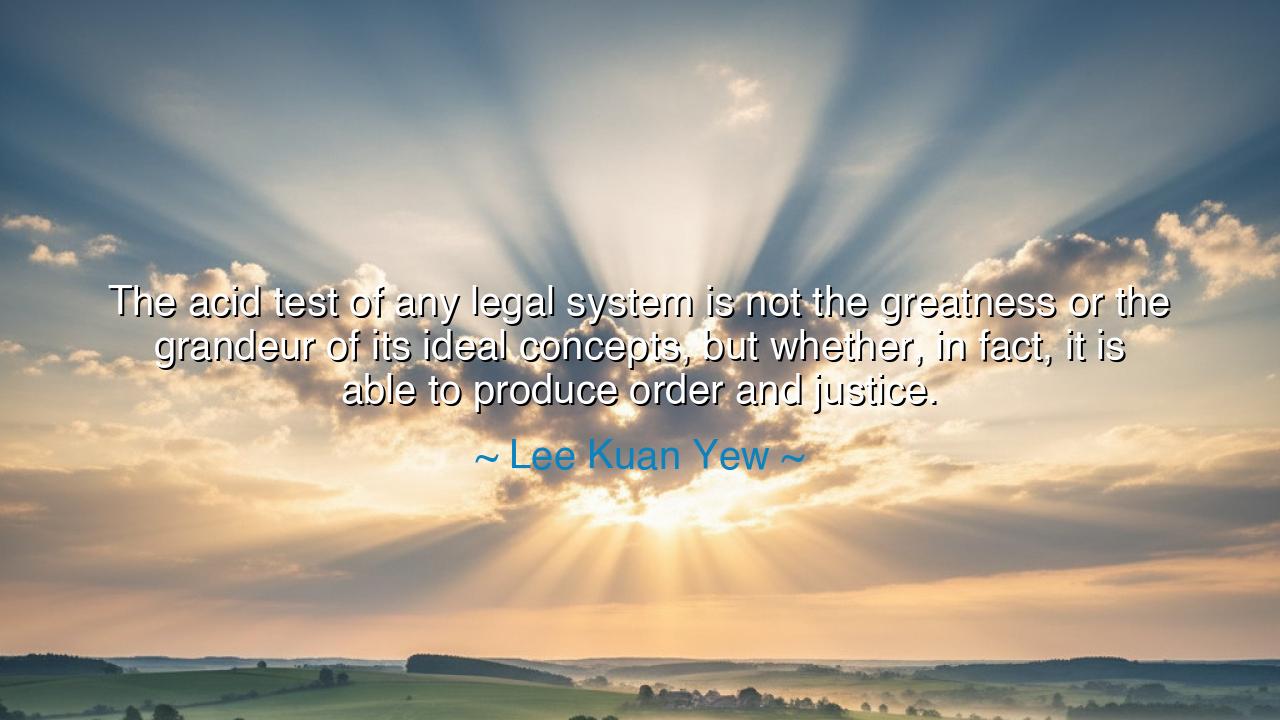
The acid test of any legal system is not the greatness or the
The acid test of any legal system is not the greatness or the grandeur of its ideal concepts, but whether, in fact, it is able to produce order and justice.






Hear the enduring words of Lee Kuan Yew: “The acid test of any legal system is not the greatness or the grandeur of its ideal concepts, but whether, in fact, it is able to produce order and justice.” In this declaration lies the wisdom of a statesman who forged a nation from fragility into strength. His words strike like a hammer upon stone, shattering illusions: for what use are lofty principles if they remain only on parchment? What value has grandeur in speech, if it does not touch the lives of the people with peace and fairness?
The meaning of this quote lies in its sharp distinction between appearance and reality. Many nations proclaim beautiful constitutions, filled with promises of liberty, equality, and dignity. Yet if these promises never materialize—if corruption reigns, if law bends to the powerful, if the weak find no protection—then such a legal system is but an empty shell, a mask hiding injustice. The true test is not how noble the words appear, but whether they deliver order that secures safety and justice that uplifts the soul of the people.
History gives us countless examples of this truth. Consider the fall of Weimar Germany. Its constitution was celebrated as one of the most advanced of its time, brimming with rights and ideals. Yet when crisis struck, it failed to produce the stability and justice needed to protect the people. In that failure, tyranny rose, and catastrophe followed. Lofty ideals alone could not preserve freedom; only their living practice in the form of order and justice could have saved the nation.
By contrast, look to Singapore itself under Lee Kuan Yew’s leadership. It was a small, fragile city-state with no natural resources, divided by culture and history. Yet by forging a legal system that did not merely boast ideals, but actively enforced order and pursued fairness, Singapore rose from vulnerability to prosperity. Laws were not ornamental; they were instruments that created stability, security, and trust. From this foundation came growth and harmony. This was the acid test in action—law proving its worth by the fruit it bore.
The deeper wisdom here is that law must serve life. If it becomes detached from reality, if it is admired only as a beautiful structure while the people suffer, then it betrays its very purpose. The ancients knew this: Aristotle himself wrote that law exists for the common good, not for abstract perfection. A law that cannot restrain disorder or deliver justice is no true law, but only a mockery of it. The measure is always practical: do the people walk in safety? Do they trust in fairness? Do the weak find protection?
The lesson for us is clear and timeless: never be deceived by rhetoric alone. Do not be satisfied with noble promises unless they bear fruit in daily life. When judging your leaders, your courts, your governments, ask always: does this system deliver justice to the people? Does it bring order to society? If not, it fails the acid test, no matter how grand its speeches or elaborate its documents.
Practical action lies before us all. Support systems of law that are transparent, enforceable, and fair. Resist corruption in all its forms, even in small matters, for corruption erodes order and destroys trust. Teach your children that laws are not mere words, but sacred tools, forged to hold chaos at bay and ensure that justice reaches all. And when laws fail, demand their reform—not in the name of grandeur, but in the name of real results.
Thus let Lee Kuan Yew’s words stand as a torch: the true worth of a legal system is not found in its majesty of ideals, but in its ability to safeguard human dignity through order and justice. This is the foundation of nations, the path of peace, and the mark of wisdom across the ages. Let future generations measure not by promises, but by fruits, and they will walk in a world both strong and just.






AAdministratorAdministrator
Welcome, honored guests. Please leave a comment, we will respond soon